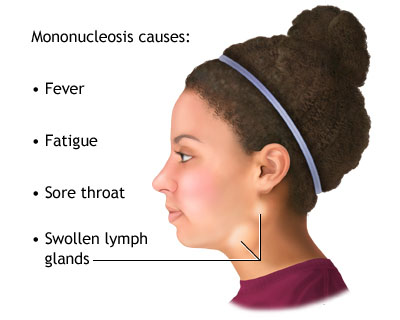Mononucleosis
Contents
When to Contact a Medical Professional
Mononucleosis is a viral infection causing fever, sore throat, and swollen lymph glands, especially in the neck.
Mononucleosis, or mono, is often spread by saliva and close contact. It is known as "the kissing disease," and occurs most often in those age 15 to 17. However, the infection may develop at any age.
Mono is usually linked to the Epstein-Barr virus (EBV), but can also be caused by other organisms such as cytomegalovirus (CMV).

This so-called "Downy cell" is typical of lymphocytes infected by EBV (Epstein Barr Virus) or CMV (Cytomegalovirus) in infectious mononucleosis. Downy cells may be classified as types I, II, or III. This is a type II Downy cell.
Mono may begin slowly with fatigue, a general ill feeling, headache, and sore throat. The sore throat slowly gets worse. Your tonsils become swollen and develop a whitish-yellow covering. The lymph nodes in the neck are frequently swollen and painful.
A pink, measles-like rash can occur and is more likely if you take the medicines ampicillin or amoxicillin for a throat infection. (Antibiotics should NOT be given without a positive Strep test.)
Swollen lymph nodes, sore throat, fatigue and headache are some of the symptoms of mononucleosis, which is caused by the Epstein-Barr virus. It is generally self-limiting and most patients can recover in 4 to 6 weeks without medications.

Symptoms of mononucleosis include:
- Drowsiness
- Fever
- General discomfort, uneasiness, or ill feeling
- Loss of appetite
- Muscle aches or stiffness
- Rash
- Sore throat
- Swollen lymph nodes, especially in the neck and armpit
- Swollen spleen
Less frequently occurring symptoms include:
- Chest pain
- Cough
- Fatigue
- Headache
- Hives
- Jaundice (yellow color to the skin)
- Neck stiffness
- Nosebleed
- Rapid heart rate
- Sensitivity to light
- Shortness of breath
The doctor or nurse will examine you. This may show that you have:
- Swollen lymph nodes in the front and back of your neck
- Swollen tonsils with a whitish-yellow covering
- Swollen liver or spleen
- Skin rash
Blood tests will be done, including:
- White blood cell (WBC) count - will be higher than normal
- Monospot test - will be positive for infectious mononucleosis.
- Antibody titer - tells the difference between a current and previous infection
The goal of treatment is to relieve symptoms. Steroid medicine (prednisone) may be given if symptoms are severe.
Antiviral drugs such as acyclovir have little or no benefit.
To relieve typical symptoms:
- Drink plenty of fluids.
- Gargle with warm salt water to ease a sore throat.
- Get plenty of rest.
- Take acetaminophen or ibuprofen for pain and fever.
You should also avoid contact sports while the spleen is swollen (to prevent it from rupturing).
The fever usually drops in 10 days, and swollen lymph glands and spleen heal in 4 weeks. Fatigue usually goes away within a few weeks, but may linger for 2 to 3 months.
Complications of mononucleosis may include:
- Bacterial infection of the throat
- Hemolytic anemia
- Hepatitis with jaundice (more common in patients older than 35)
- Inflammation of the testicles (orchitis)
- Nervous system problems (rare), such as:
- Guillain-Barre syndrome
- Meningitis
- Seizures
- Temporary facial paralysis (Bell's palsy)
- Uncoordinated movements (ataxia)
- Spleen rupture (rare; avoid pressure on the spleen)
- Skin rash (Gianotti-Crosti syndrome - acrodermatitis ofchildhood)
Death is possible in people who have a weakened immune system.
When to Contact a Medical Professional
The initial symptoms of mono feel very much like a typical viral illness. It is not necessary to contact a health care provider unless symptoms last longer than 10 days or you develop the following:
- Abdominal pain
- Breathing difficulty
- Persistent high fevers (more than 101.5°F)
- Severe headache
- Weakness in the arm or legs
- Yellow discoloration of your eyes or skin
Call 103 or go to an emergency room if you develop:
-
Sharp, sudden, severe abdominal pain
-
Significant difficulty swallowing or breathing
-
Stiff neck or severe weakness
Persons with mononucleosis may be contagious while they have symptoms and for up to a few months afterwards. How long someone with the disease is contagious varies. The virus can live for several hours outside the body. Avoid kissing or sharing utensils if you or someone close to you has mono.
Source: http://www.nlm.nih.gov/medlineplus/infectiousmononucleosis.html

